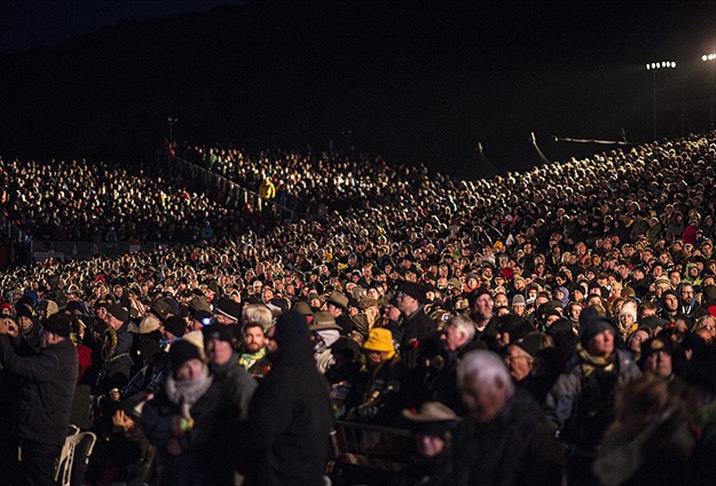
By Ayse Humeyra Atilgan
CANAKKALE, Turkey
The centenary of the Gallipoli landings has brought together thousands of people from Australia, New Zealand and other countries to honor their war dead.
April 25, commemorated as Anzac Day after the Australian and New Zealand Army Corps soldiers who gave their lives in the doomed eight-month campaign, sees thousands of people from the southern hemisphere travel to Turkey every year to mark their nations’ first military action in World War I.
The Anadolu Agency spoke to some ordinary men and women who had come to the Gallipoli peninsula to remember those who sacrificed their lives.
Boyd Buchanan and his wife Murilyn endured a 20-hour plane journey from their home in Australia to pay homage to their ancestors who fought and died in Turkey.
"It is important that they understand the sacrifice the people made previously for the privilege and the freedoms that we have today," Boyd told AA, referring to the increasing recognition of the significance of Gallipoli among younger Australians.
The 61-year-old praised the hospitality he and his wife have received in Turkey, adding that it is important to understand "the respect and the value that the Turkish people hold for their previous enemies."
While Gallipoli saw young men from across the world die in their thousands, the battle has a special resonance for Australians, New Zealanders and Turks as it helped form their national identities.
Boyd said the respect felt between Turkey, Australia and New Zealand today was due to "recognizing that Turkish people were defending their homeland and we were the invaders, respecting them as strong enemies but also great friends."
The couple was among the thousands visiting the former battlefields, including Ruth Pope.
"Our aim was to be on the soil, to walk on the sand and to learn what happened," the 63-year-old from Sydney said.
"As Australians, we want to know how our culture has been formed, how relationships with the rest of the world were formed and to know that we Australians and Turks are the mothers, fathers and the siblings of men and boys that went to war or lost their lives."
She added: "We respect you, and you respect us."
Ruth and her husband Allan arrived in Gallipoli early Saturday for the dawn service to mark the exact time Anzac boots landed on the beaches of Turkey 100 years ago.
Around 8,000 Australians and 2,000 New Zealanders made the trip to the battlefields overlooking the Dardanelles Strait.
Allan said it was a pilgrimage "to come back here to see basically where our culture of today started."
The campaign, known as the Battle of Canakkale in Turkey, was the Allies' attempt to open the Dardanelles to allow warships to threaten the Ottoman capital, Istanbul, and take Turkey out of the war.
However, the fierce resistance shown by the Ottoman forces led to a bloody confrontation that saw more than 130,000 killed, including more than 8,000 Australians and nearly 3,000 New Zealanders.
"Our population in Australia would be a lot bigger now, if it was not for wars that we lost so many young men in," Helen Caldwell, 64, told AA.
She said Gallipoli has become seared in the memories of Australians and New Zealanders because it was "such a long way away” and was the first conflict the fledgling nations had taken part in.
Comparing her life to the men who died in the battle, Helen blinked back tears as she recalled the loss of "those single men [who] did not even reach 24."
Like all Australian and New Zealand visitors to Gallipoli this year, Helen and her husband were selected in a government-run lottery. Only a quarter of the 40,000 applicants received tickets to attend.
Among them was a group of students aged 16 to 19 from across over New Zealand.
Their leader Jacki Couchman said the youth of her group emphasized what the soldiers must have gone through. "They are the same age as a lot of men who fought and died in Gallipoli," she said.
"New Zealand is a very small country, so all of the young people here are descendants of people who fought here." Jacki’s great-great-uncle fought at Gallipoli and was killed on Aug. 8, 1915.
"We are very delighted to be here with Australian and Turkish colleagues," she said, referring to the group’s role as youth ambassadors responsible for social media feeds keeping those who could not make the trip informed about events and sights around the peninsula.
John Carnell, whose great-grandfather died at Gallipoli on Aug. 10, 1915, aged 56, told AA that it was "mateship and bondship that we come to remember, not the actual killing."
He added: "It is such a tragedy that so many people had to die. It was a very much a technical defeat for the Australian and New Zealand and British forces. The Turkish defenses absolutely won.
“But it was not about that. It was about the love for each other that they would know there was a machine gun in the next trench but they would still go with their mates even though they knew they would die."
Looking at the beautiful peninsula on a sunny day, he said he found it hard to imagine the scenes of battle 100 years ago.
"Let's learn from history and not do it again in the future," he uttered. "That is what we should be learning.
Anadolu Agency website contains only a portion of the news stories offered to subscribers in the AA News Broadcasting System (HAS), and in summarized form. Please contact us for subscription options.

